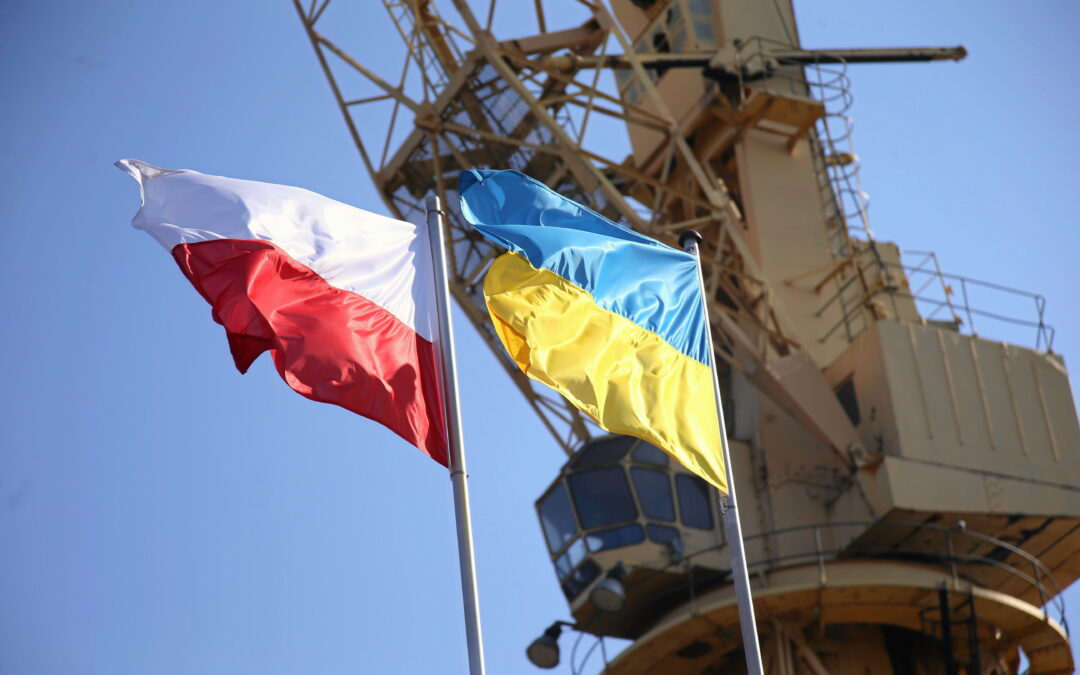Half of businesses in Poland employ Ukrainian workers, up significantly from last year, a new survey has shown. It also found that Ukrainians are increasingly occupying higher-level positions in the Polish labour market.
The study, carried out by HR consultancy Personnel Service, found that 49% of the firms it surveyed had at least one Ukrainian employee, compared to 34% a year earlier. Over that period, Poland’s Ukrainian community – already the country’s largest immigrant group – has roughly doubled in size thanks to a wave of refugees.
“People of working age who found refuge in Poland after the outbreak of war and wanted to work found their way into the labour market without any problems,” says Krzysztof Inglot, Personnel Service’s founder, commenting on the findings, which were based on a nationwide sample of 634 firms that employ 10 or more staff.
The Polish government estimates that 1.3-1.4 million Ukraine refugees remain in the country one year on from Russia’s full-scale invasion.
Poland has been the primary destination for those fleeing the war https://t.co/HQB8YAvcpQ
— Notes from Poland 🇵🇱 (@notesfrompoland) February 23, 2023
Last year, the number of foreign workers registered in Poland’s social insurance system passed one million for the first time. Currently, almost 740,000 of them are Ukrainians, noted Andrzej Kubisiak, deputy director of the Polish Economic Institute (PIE), earlier this month.
A simplified process granting Ukrainian refugees access to the labour market has been used over 900,000 times since it was introduced by the government a year ago.
Personnel Service’s study – which surveyed Ukrainian workers as well as firms – also found that companies are increasingly hiring Ukrainians for higher-level positions.
Almost one in three Ukrainian employees (32%) work as middle managers, which represents an increase of 13.5 percentage points compared to last year. The share of Ukrainian workers employed as top-level managers rose by 2.5 percentage points to 9%.
Almost 14,000 businesses were created by Ukrainians in Poland in the first nine months of 2022, reports @PIE_NET_PL
In April their number tripled after the government allowed Ukrainians to run businesses on the same terms as Poles https://t.co/Gm0VfLeAIv
— Notes from Poland 🇵🇱 (@notesfrompoland) January 12, 2023
That change has coincided with a partial shift in the demographics of Ukrainian workers in Poland. Many Ukrainian men who had previously worked in sectors such as construction, manufacturing and transport returned home last year to held defend their country following Russia’s invasion.
Meanwhile, the vast majority of new arrivals since then have been women and children, who have fled as refugees, with most men banned from leaving Ukrainian during the war.
Many of the refugees who came to Poland were well-qualified people with higher education, whereas before the war migrants often came from Ukraine for seasonal jobs in sectors such as agriculture or construction.
The number of Ukrainians employed on construction sites in Poland (the yellow bar) fell dramatically last year as many men returned to Ukraine to defend their country.
The blue bar shows the number of non-Ukrainian foreigners working on construction sites pic.twitter.com/OfXZafxWAc
— Daniel Tilles (@danieltilles1) March 14, 2023
The survey shows, however, that Ukrainian workers most often (in 30% of cases) earn between 25 zloty and 29.9 zloty gross per hour (€5.33-6.38), compared to an average hourly wage of 44.16 across all workers. Only 8% of Ukrainians earn over 40 zloty per hour.
“Worryingly, there has been an increase in the proportion of employers admitting to offering staff from the east a rate below the minimum wage – 5% compared to 1% in the previous survey,” the report reads.
Personnel Service found that almost one in two (46%) employers have a positive attitude towards employees from Ukraine and that 30% are planning to seek workers from Ukraine over the next 12 months.
When asked what they value Ukrainian employees most for, employers point to quick adaptation (44%), work ethic (39%) and fast language acquisition (32%).
This week marks the one-year anniversary of Russia's full-scale invasion of Ukraine.
To find out what the last year has been like for the refugees, I went back to talk to some of the Ukrainians I had previously interviewed.https://t.co/tA6x40Bcgn
— Alicja Ptak (@AlicjaPtak4) February 21, 2023
Main image credit: Cezary Aszkielowicz / Agencja Wyborcza.pl

Alicja Ptak is deputy editor-in-chief of Notes from Poland and a multimedia journalist. She has written for Clean Energy Wire and The Times, and she hosts her own podcast, The Warsaw Wire, on Poland’s economy and energy sector. She previously worked for Reuters.




















